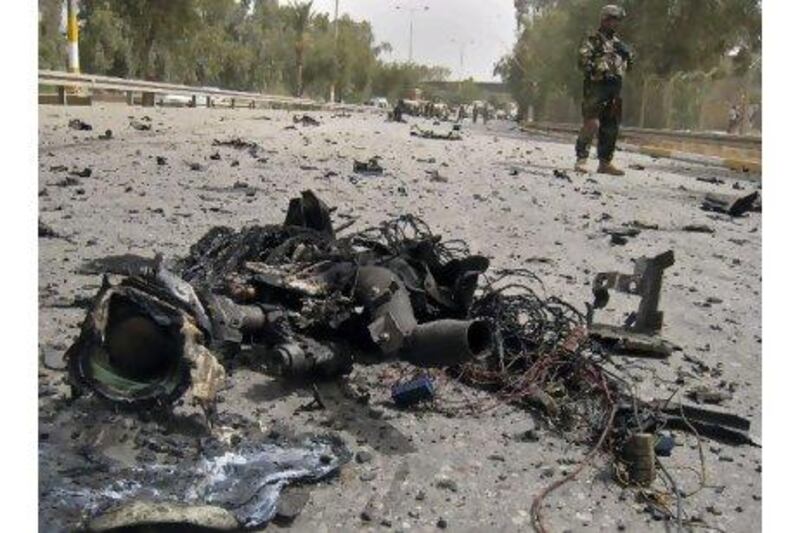BAGHDAD // The Iraqi government continues to insist the Arab League summit, scheduled for Baghdad next month, must go ahead. In reality however, few Iraqis expect their capital to host the meeting.
Militant attacks, including recent car bombs in the heart of Baghdad, are a reminder of Iraq's persistent danger and the dogged insurgency that years of warfare and billions of dollars have failed to defeat.
More critically, Iraqis say, their country's political divisions, a wave of revolutions, regional sectarian tensions and a struggle for control between Iran and its Arab neighbours make it all but impossible for Arab heads of state to gather in Baghdad.
"There are huge political problems inside Iraq. The various political groups here can't agree on much, which makes it difficult to host such a meeting," said Hani Ashour, an adviser to the Iraqiyya political bloc. "On top of that there is a storm of political problems in the Arab world at the moment, which mean the Arab leaders don't actually want to meet. If there is a meeting, it will just be a shouting match."
Uprisings have affected much of the region. Tunisia and Egypt have already seen longstanding rulers deposed, while Libya, Yemen, Syria, Jordan, Iraq, Bahrain and Saudi Arabia have all experienced protests.
Demonstrators in Iraq have made no secret of their disgust at the nation's political class and the corruption and stagnation blighting the country, as well as their dismay at failing national reconciliation efforts.
Iraq remains divided, despite an ostensibly national coalition government led by the prime minister, Nouri al Maliki. His critics, including the Iraqiyya bloc, accuse him of reneging on power-sharing arrangements agreed to last year following indecisive elections in the spring.
Since Mr al Maliki began his second term just over four months ago, those divisions have never been far from the surface, as politicians continued to jockey for power and influence in Baghdad.
But regional developments, particularly an uprising in Bahrain, have done nothing to help heal the rifts.
The suppression of Shiites by Bahrain's ruling Sunnis reverberated strongly in Iraq. Baghdad's government is dominated by sectarian Shiite parties, still mindful of their recent pasts living under a Sunni dictatorship.
Many of those parties maintain close links to Iran, and both capitals issued sharp condemnations of Bahraini authorities.
That Bahrain's king requested military assistance from Saudi Arabia and the Untied Arab Emirates - Sunni majority countries - to help quell the protests only added to the anger felt in Baghdad. Mr al Maliki has warned the Gulf state that it had heightened the risk of a regional sectarian war.
Saudi Arabia and its allies insisted that Tehran had been inciting the Bahrain rebellion as part of its own bid for regional dominance.
Those arguments continue to be played out inside Iraqi, with Shiites protesting in support of Bahrain's rebels, while Iraq's Sunni community sees the issue as at best a distraction from domestic concerns or, at worst, evidence that Tehran now pulls Baghdad's political strings.
The Gulf Cooperation Council has already requested that the Arab League summit be cancelled. Iraq's foreign minster, Hoshyar Zebari, on Monday said Baghdad would agree to a postponement but not an outright cancellation.
Mohammad Salman, an Iraqiyya MP, said a postponement was now unlikely. "I expect the summit will be cancelled," he said. "It would require magic for it to go ahead now."
He blamed Iraqis politicians for bringing about the collapse, saying they had botched the handling of the Bahrain crisis. "All the statements coming from Iraqi politicians towards the Gulf states over Bahrain did nothing to help the situation," Mr Salman said.
"Iraq had a great opportunity to host the summit and discuss major issues affecting the country and the region, including terrorism and redevelopment, but that was undermined by politicians who made emotional, unprofessional statements."
Iraqiyya won wide backing from Iraq's Sunni community in last year's elections, while the ruling National Alliance, Mr al Maliki's
coalition, had a much narrower, Shiite base of support.
Abdel Hadi al Hassani, a National Alliance MP, insisted he was "surprised" and "angry" that Gulf states had moved to scrap the
summit.
"It's unacceptable for them to try to cancel the summit. They are not behaving in a properly diplomatic way," he said. "They cannot cancel it just for some statements made by some Iraqi parties that they do not agree with."
Mr al Hassani warned that dropping the meeting entirely would work against efforts to bring Baghdad back into the Arab fold. Iraq has had uneasy relationships with the Gulf since a Shiite government took over in Baghdad, while its political ties to Iran have improved dramatically.
"If they cancel the summit, it will only work to separate Iraq from the Arab environment," Mr al Hassani cautioned.





